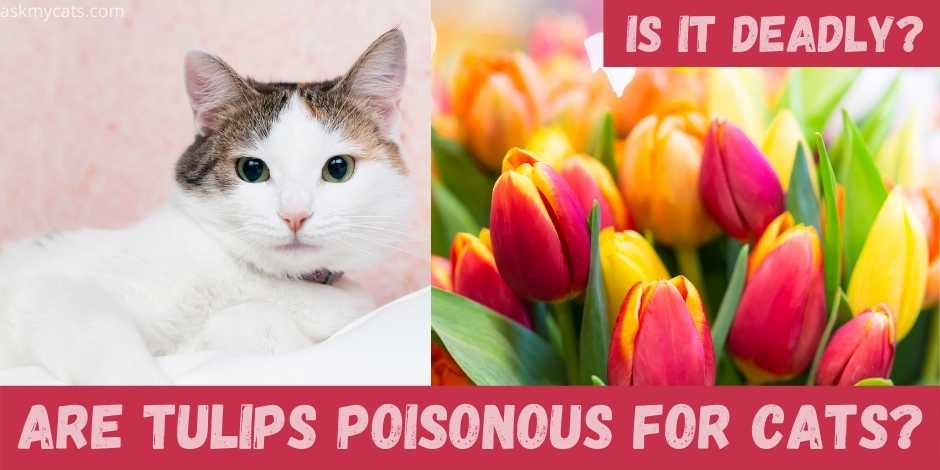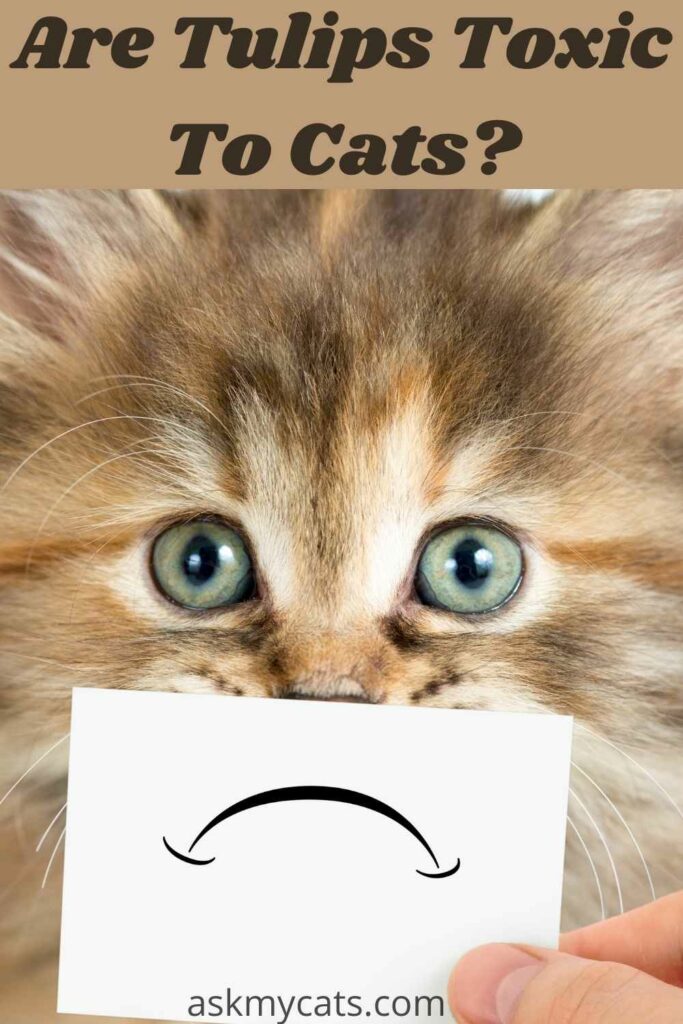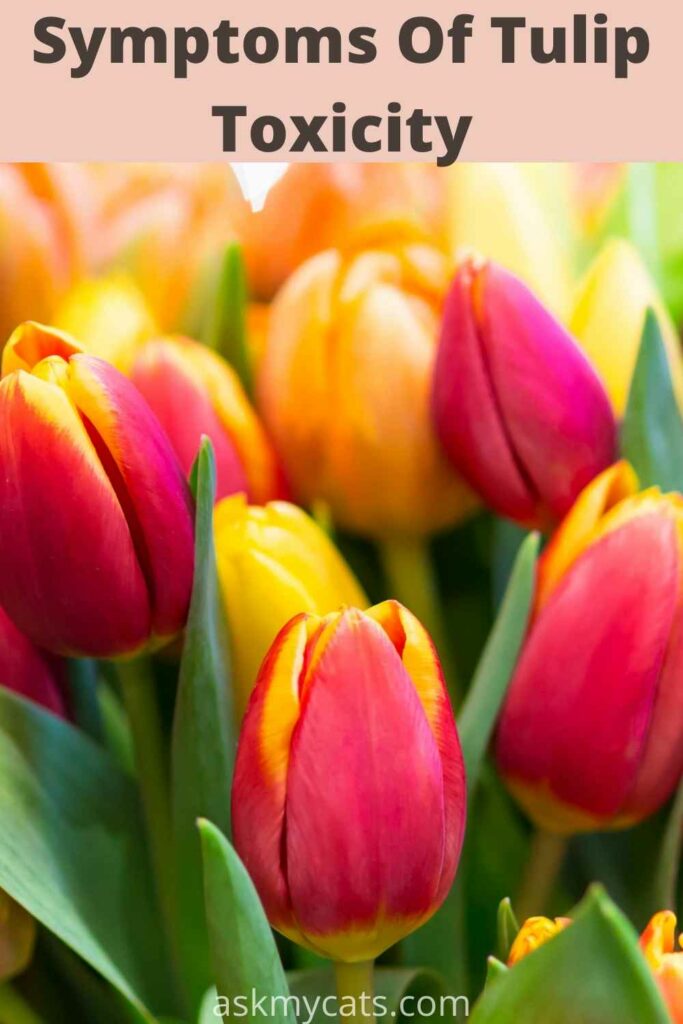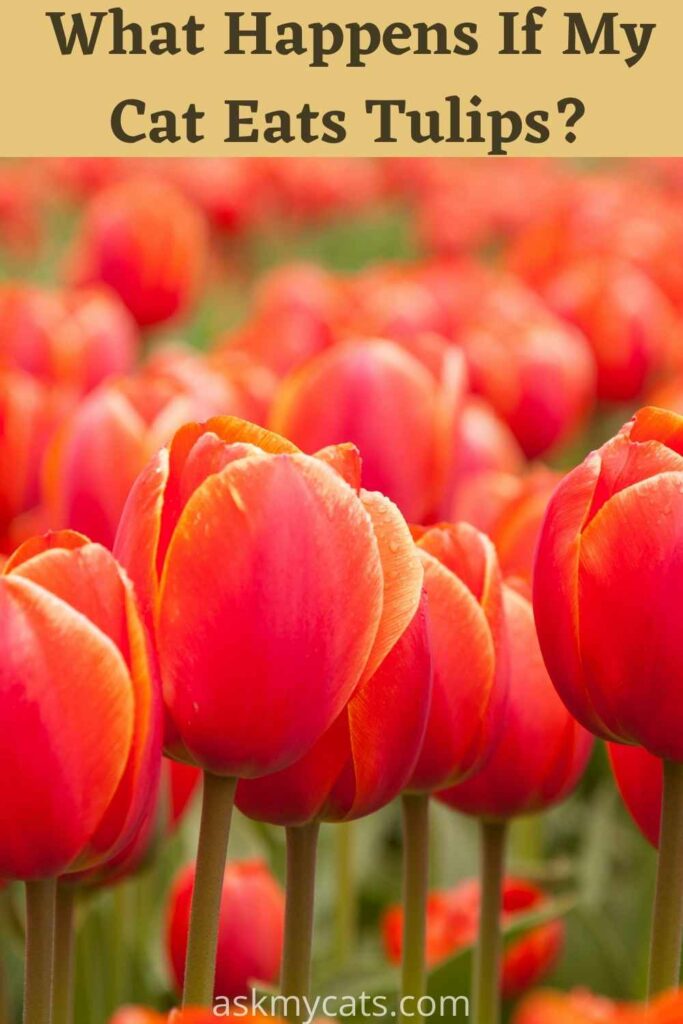Once in your lifetime, you might have come across tulips that are considered to be extremely gorgeous and are said to beautify the whole ambiance, and one time or the other you may have thought of bringing these flowers into your house to incline people around you, but when you are a cat parent, everything has to be analyzed, right?
Cats being extremely intuitive and curious animals, tend to become very analyzing of the whole situation, and it is pretty evident they are going to come across tulips too if you happen to bring them nearer to them.
however, the main query here is to know why they are so poisonous and toxic for cats to be known as to why not to take any risk in such occurrences.
Before getting further, let us clear out the first question that must have popped up in your mind which is, are tulips poisonous to cats?
Yes, tulips are said to be highly poisonous as they comprise of two toxins which are tulipalin A and tulipalin B which if ingested can be extremely hazardous to a cat.
Let’s get further now.


Give Your Cat the Perfect Day
Get the Free Ebook!
Why Cats Like Tulips?
Cats have an insatiable eagerness and inquisitiveness when it comes to being around plants or anything in particular. They are natural predators who have the habit of getting close to things to check if they possess any harm.
When it comes to tulips, tulips indeed seem a very gracious plant that generates a scent that is specifically honey-like aroma. Cats are all about scents which make them highly keen to be found around the tulips irrespective of how toxic it can be for your cat.
Are Tulips Toxic To Cats?

Tulips plants contain a group of toxins that is tulipalin which further gets divided into tulipalin A and tulipalin B that has the property to trigger allergies and also make the vital organs unresponsive, which usually happens in the form of diarrhea, excessive drooling, lethargy, loss of appetite and itching.
To further break it down in more simples words, tulipalin A causes inflammation of the skin whereas tulipalin B is an antibacterial compound that tulip plants produce to protect themselves from any prey and herbivores.
In tulips plants, these toxins are used to ward off any herbivores which work as a negative aspect in the case of animals, including cats.
In many other services, cats happen to be in a dazed state accompanied by disassociation which can happen when the tulip toxin comes in direct contact with the physical skin.
What Parts Of The Tulip Are Toxic To Cats?
All parts of the tulip are toxic to cats including leaves, stems, and bulbs. Although, what needs the utmost beaming sight is the bulb of a tulip which is said to be the most toxic if comes in contact with a feline’s skin.
Every part of the tulip can make a cat severely ill depending upon your cat’s age, and exposure to the vulnerability, another thing to pay great attention to is that the tulip bulb is the most concentrated with tulipalin that further breaks down into A and B which if ingested by a cat can make a cat extremely ill and leave a residue and make them prone to further illnesses.
While it’s been hugely speculated that a cat may die because of the toxicity, however, the probability of it turning out fatal is very less and the chances of it being highly hazardous are still big in the picture.
Symptoms Of Tulip Toxicity
There are many symptoms a cat is likely to possess once it comes in contact with any part of the tulip.
Some of such toxicities are mentioned below which need to be categorized on the basis of the quantity a feline seems to ingest or eat.

Some of the symptoms in case of slight toxicity which means less quantity is
- Discomfort
- Drooling
- Mouth irritation
- Itching
Furthermore, symptoms that show higher toxicity levels which also is an indication of excess levels of ingestion are
- Nausea
- Vomiting
- Diarrhea
- Dizziness
- Feeling dazed
- Disassociation
- Lack of appetite
Such symptoms are usually the ones that need to be consulted especially when a cat is old, and going through underlying health conditions as such symptoms can often trigger vital organs and their turning hostile is also an unfolded condition that persists here.
Are Tulips Leaves Poisonous For Cats?
Every part of a tulip plant is poisonous to cats such as stems, petals, and pollens including leaves.
Such parts of the tulip plants turn out to be excessively harmful to cats that are pregnant, kittens, and ill cats. The toxicity expands itself when such cats are the carrier of the toxins and these bodies tend to divide their toxins in more adverse ways and also because they lack the mechanism of coping, unlike any healthy and normal cat.
What Happens If My Cat Eats Tulips?

Your cat is likely to notice certain symptoms once it ingests tulips which can be often detected because of the behavioral signs they seem to drop.
Some of such symptoms are as follows
- Loss of coordination
- Salivation
- Weakness
- Lethargy
- Drooling
These symptoms need to be looked upon as they might deprive your cat of all the nutrients a feline should have in their diets that assure their healthy lifestyle.
An urgent veterinary consultation should be taken in case these symptoms persist for a long period of time including lack of appetite.
How Long Does Tulip Poisoning Stays In Cats?
The recovery period usually in cases of toxicity largely depends upon the intake that was taken inside the body by a feline. The resultant symptoms and their reoccurrence also play a vital role in such cases.
During such occurrences, proper rest is usually advisable with alternatively serving them a bland diet which will ensure they outgrow the recovery phase and heal through the toxicity that they seem to ingest.
What Should I Do If My Eats Tulips?
If you find your cat eating a tulip, make sure your cat vomits immediately after it to ensure that your cat has puked out most of the toxins, keep your cat hydrated as the toxins will leave your cat dehydrated which can also lead to respiratory failure if your cat is in later years of her life and also if it’s a kitten.
A healthy feline is likely to show fewer symptoms but it is still advised to get a veterinarian on loop to prevent further escalation of this occurrence.
Though, it needs to be addressed that your feline can only refrain away from any more inclination toward diseases if the situation is put to utmost sight without any negligence.
Frequently Asked Questions
Why tulip bulbs are toxic?
Tulip bulbs are toxic as it comprises a toxin that further divides itself into A and B namely tulipalin which can cause irritation to a feline’s sensitive skin which is also ingested in complex amounts and can cause gastrointestinal complications.
What is tulips fragrance comprised of?
Tulips scents are usually a honey-like aroma that is comprised of a significant amount of phenethyl alcohol and phenylacetaldehyde.
Are tulips bad for cats?
Tulips are bad for cats as they can lead to diarrhea, vomiting, drooling, rapid heart rate, seizures, and also labored breathing.
Final Words
At the end of this article, we have come near to the simple yet startling conclusion that irrespective of a tulip’s enamoring presence that humans find appealing, it’s not at all advisable for felines as there is the contamination of toxins in every part of the plant’s body and if it comes in contact with cat’s skin, it can be a cause of severe irritation and can also aggravate allergies leading to many illnesses.
Now, to put my words to a serene end, I would like to drop a question for you all to answer in your comments and ponder some thoughts on the other paw-rent’s replies too.
Okay, so gear up here it comes, when was the first time you realized tulips are toxic, what was your first reaction? How you responded to the sudden amusing fact.
Come, keep inundating me with comments.

Thank you for this article. My friend brought me a tulip plant for Easter and when I saw my cat attempt to nibble the leaves I immediately removed it to a place she could not get to and searched online to see if tulips were toxic for cats. Found your article, which was quite the eye opener. My cat did not exhibit any symptoms so I caught her in time. I did forward my friend the link. She is also a cat person and needs to know to keep her cats safe. An important lesson: well meaning friends or family can give you a plant that can make your cat extremely ill or worse.